Looking for the perfect Nakiri knife for your kitchen? On this page, we discuss the 5 best Nakiri knives money can buy in 2023.
A high-quality Nakiri knife can be a real boon when preparing vegetables and similar tasks. They’re shaped similar to a Chinese cleaver but are significantly lighter and easier to handle. If you find an option that’s well balanced, you may just fall in love with it.
The wide, rectangular shape that comes with Nakiri means that scooping and other tasks that require good coverage can be much easier to accomplish. Keep in mind that some products are completely flat without any curve in the blade at all, so you’ll have to chop vertically.
Knives with a curved edge or tip can be better for roll cutting and mincing tasks.
Pressed for time? Our absolute favorite option in this category is this one:
– Tojiro Nakiri Knife F-502
It won our editor’s choice for several reasons; it’s sized comfortably for all but the smallest of hands and it has been received exceptionally well by reviewers and consumers across the internet. It’s our best ‘all-rounder’ should feel right at home in most kitchens.
Keep in mind, however, that your goals and preferences as a chef will determine the knife that works best for you. You may prefer one of the other options listed below.
If you’d like to learn more about how to choose the right knife for you, check out our chef knife buying guide.
While we’re on the subject, check out this deep-dive into the best chef knives.
Top 5 Nakiri Knives
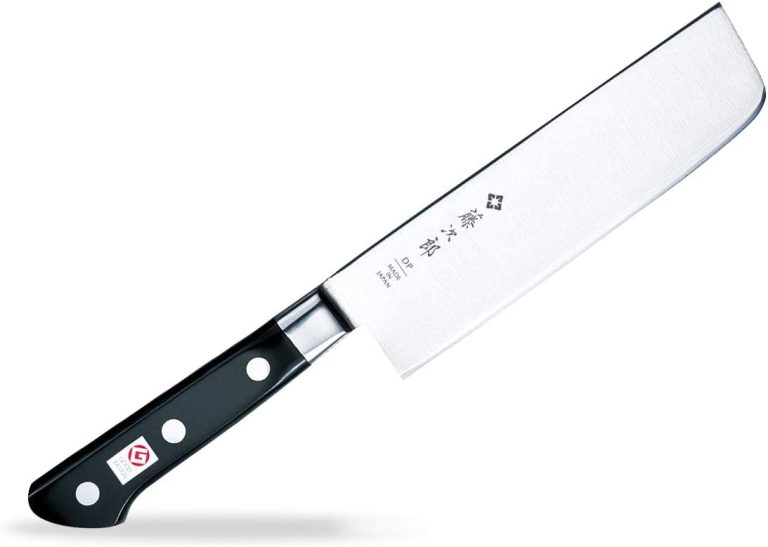  Editor's Choice Editor's Choice | ||||
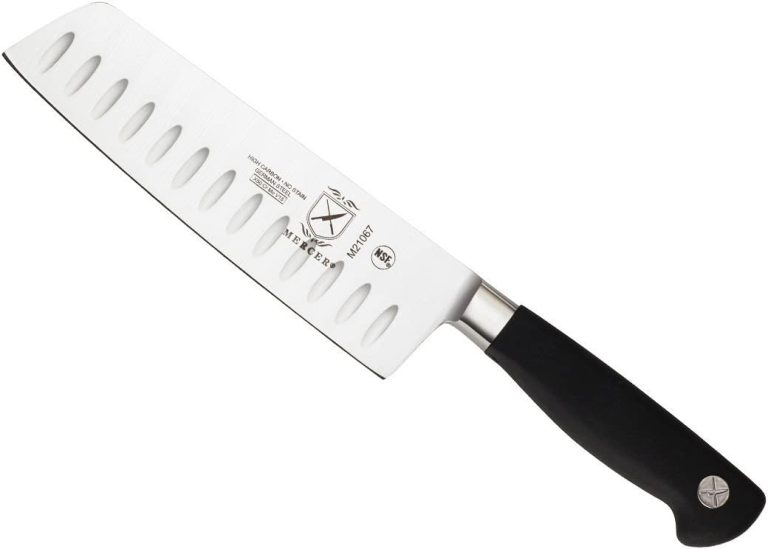 Best Budget Nakiri Knife | ||||
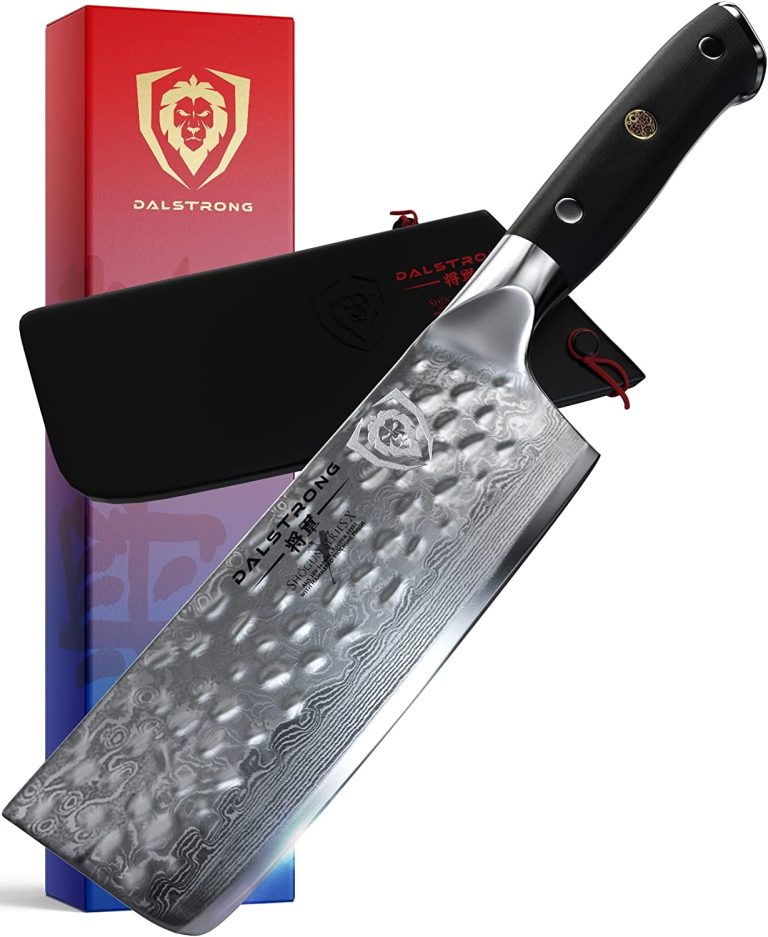 | ||||
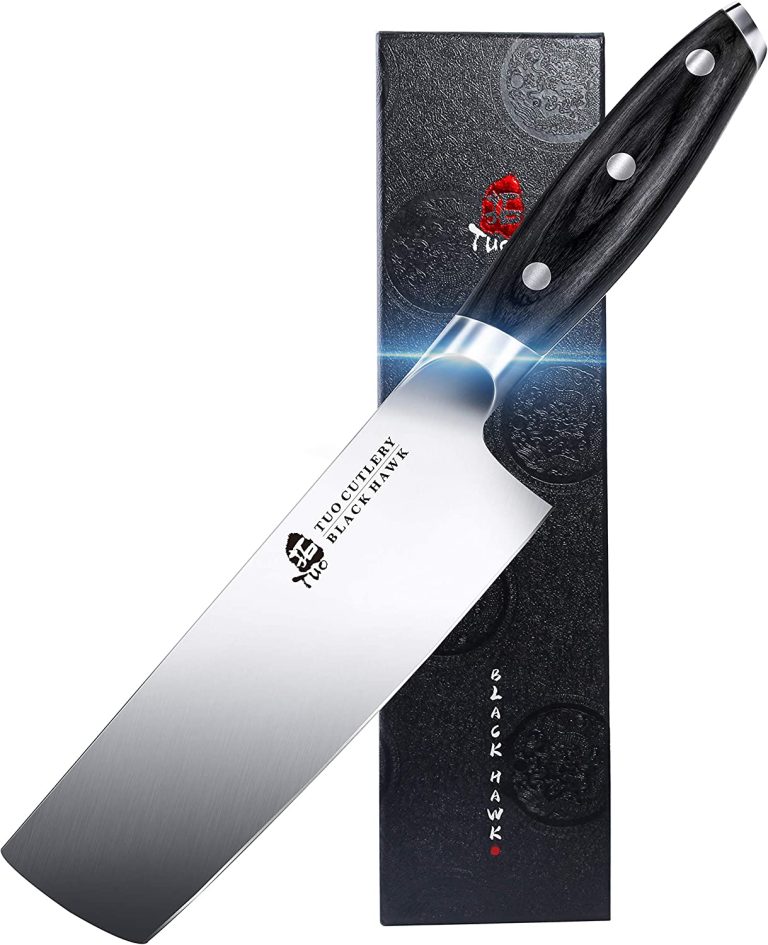 | Check Price | |||
 | Check Price |
1. Tojiro Nakiri Knife F-502 – Editor’s Choice
An exceptional Nakiri knife that’s very well sized.
READ OUR FULL REVIEW OF THE TOJIRO F-502
Tojiro Nakiri Knife F-502 Specifications
About the Knife
This option from Tojiro has more than earned its place right at the very top of our list. It offers phenomenal levels of comfort, sharpness, and overall balance. It should feel fantastic in the hand of the vast majority of people.
We’re particularly fond of the slightly curved blade and tip. These make this knife an absolute breeze to use for roll cutting when mincing or dicing various vegetables in the kitchen. You may be amazed how much easier this thing is to use than your average ‘bargain basement’ knife.
The blade size used here sits in something of a ‘Goldilocks zone.’ It’s large enough to tackle bigger veg like cabbage but small enough to remain comfortable for things like onion and even garlic.
The HRC of 60 on this knife means it should have exceptional sharpness and sharpness retention.
Maintenance and Cleaning
When sharpening this knife, it’s best to start with a fine grains whetstone and only move the coarser stones if your knife is particularly dulled.
Tojiro discusses the process in detail on this page.
In terms of regular maintenance, Tojiro recommends the following:
- Clean after use with a soft sponge and mild soaps. Allow drying completely before storing.
- After cutting acidic foods like citrus or pickles, make sure to completely clean off any residue.
- Sharpen your knife once or twice a month.
- Do not leave your knife in water to ‘soak’ it.
Pros:
- Exceptionally well balanced
- Great for roll cuts
- Lifetime warranty
- Very comfortable
Cons:
- The packaging is a little dull
- The bolster is a little rough
- Keep it dry – rust is possible
2. Mercer Culinary M21067 Genesis 7’’ Nakiri Knife – Best Budget Nakiri Knife
A fantastic budget option with much greater performance than its price tag may suggest.
Interested in stretching your budget further? Check out our review of the best chef knives under $200.
Mercer Culinary M21067 Genesis 7’’ Nakiri Knife Specifications
About the Knife
We’re not quite sure how Mercer has managed it, but this knife is truly breathtaking when you consider its sub-$70 asking price. You’ll struggle to find a product that performs this well for less.
The handle is made from a dynamically vulcanized polymer called Santoprene. In layperson’s terms, this material offers superior levels of both slip resistance and comfort. Add this to the fact that this product is very well balanced and you’re looking at a budget-level knife that performs and feels like an option that’s far more expensive.
The Granton-edge blade here makes this product great for preparing ‘stickier’ meats that would otherwise adhere to the knife. It’s also a real workhorse for most veg and mincing prep.
This knife has an HRC rating of 56+/-1. This means that it offers a degree of flexibility for tasks that require a bit more dexterity. It should hold its sharpness reasonably well but will need to be sharpened occasionally.
The overall durability and limited lifetime warranty on offer here make this knife tough to ignore in our opinion.
Maintenance and Cleaning
When maintaining your knife, Mercer recommends that you decide whether you need to hone or sharpen it. Honing a blade ‘stands up’ blade edges that have started to dull while sharpening removes layers of metal to reveal sharper new edges.
Different tools and techniques are required for both honing and sharpening. This guide from Mercer explores the topic in detail.
This knife should be cleaned after each use with a soft cloth or sponge and mild to medium soaps. It should be fully dried before storing in a sheath or knife block.
For more details about Mercer knife care, click here.
Pros:
- Exceptional value
- Granton edge for reduced sticking
- Limited lifetime warranty
- Comfortable, slip-free handle
Cons:
- Needs regular sharpening
- The blade can collect chips
- Rusts when wet
3. Dalstrong 6’’ Shogun Series X Nakiri Knife
An attractive Damascus steel option with a razor-sharp edge.
Dalstrong 6’’ Shogun Series X Nakiri Knife Specifications
About the Knife
While the $120-$130 price places this Dalstrong knife in a more premium category than other options on this page, we think it more than justifies its price tag. The sharpness on offer here is really quite something.
This product is rated as 62+ on the Rockwell hardness c scale. In short, this means its blade is exceptionally sharp and will hold this sharpness for significantly longer than you may be used to.
In terms of comfort, the balance and overall feel of this product deserve a ton of praise. The G10 handle resists both moisture and heat very well; you’ll always feel in control in the kitchen with this one.
The full-tang design and lifetime warranty against defects win bonus points in the durability department too. We’re big fans of this Nakiri knife.
Maintenance and Cleaning
If sharpening this knife yourself at home, use a whetstone and sharpen it at an angle between 10 and 15 degrees. The lower your angle, the sharper your edge will be.
Alternatively, you might like to use Dalstrong’s professional knife sharpening service.
Follow these tips when looking after your knife:
- Always hand-wash with mild soaps and temperatures
- Never soak your knife and always let it fully dry before storing
- Store in a sheath, knife block, or on a magnetic knife rail
Pros:
- Exceptionally sharp blade
- Moisture and heat-resistant handle
- Durable, ergonomic design
- Beautiful appearance and packaging
Cons:
- Quite expensive
- Heavy for smaller hands
- Blade can chip
4. Tuo Black Hawk Series 6.5’’ Nakiri Knife
An affordable all-rounder that feels great in the hand.
Tuo Black Hawk Series 6.5’’ Nakiri Knife Specifications
About the Knife
One of the first things you notice when using this TUO knife is its Pakkawood handle. Not only does it look fantastic, but it offers excellent levels of heat and moisture resistance too. Just keep in mind that some users report a ‘rough’ feeling from the handle scales protruding past the bolster.
For the price, though, this will likely be forgivable for most people.
Considering the asking price of $30-45, this option is an absolute steal. Each unit is hand-sharpened using the ancient Honbazuke method. This means the blade has been sharpened vertically and horizontally and finally polished on a leather stropping block for optimal sharpness and performance.
This thing is impressively sharp considering the price and should hold this sharpness reasonably well. Keep in mind that the HRC of 56+2 means it’s a little more flexible than some other options listed on this page.
With a full-tang design and a great overall build quality, there shouldn’t be much to worry about here in terms of durability.
Maintenance and Cleaning
TUO recommends using honing steel for most of their knives. Follow these basic steps:
- Hold the steel vertically against a flat surface
- With your knife at a 20-degree angle, push your knife down towards your flat surface along the length of your honing steel
- Start with the heel of your knife at the top of your steel
- Repeat several times until your blade is sharp
This knife should never be cleaned in a dishwasher. Always use mild soaps and moderate temperatures. Dry fully before storing in a sheath or knife block.
Pros:
- Gorgeous Pakkawood handle
- Great durability
- Very affordable
Cons:
- The handle can feel rough
- Perhaps too flexible for some
- Needs regular sharpening
5. Shun Premier 5.5’’ Nakiri Knife

A lightweight powerhouse that’s a demon in the kitchen.
Shun Premier 5.5’’ Nakiri Knife Specifications
About the Knife
At $170+, this is one of the most premium options listed on this page. What you get for your money, however, is a knife that will elevate practically all aspects of your work in the kitchen. Expect incredible sharpness, great balance, and an ergonomic design that feels fantastic in the hand.
The HRC rating of 60-61 means that this product should retain its original sharpness for many months to come. This option is particularly well suited to chopping denser, more stubborn vegetables like pumpkin or squash.
If you’re concerned about durability here, don’t be. This Shun knife uses a full-tang design and comes with a limited lifetime warranty for added peace of mind. It gets a huge thumbs up from us.
Maintenance and Cleaning
As a Shun customer, you have access to free lifetime sharpening! This can be accessed at a walk-in site or via post. The company’s professional sharpeners will return your blade to its former glory in record time.
Shun does not recommend that you clean this knife in the dishwasher. Instead, use mild soaps, a soft sponge, and moderate temperatures after each use.
Pros:
- Great sharpness retention
- Pakkawood handle feels fantastic
- Free sharpening service
Cons:
- Harder blade – can chip
- Quite expensive
- Perhaps a touch too short
FAQ
This section addresses some of the most common queries we see about Nakiri knives online.
Read Now >> Nakiri vs Santoku
What are Nakiri Knives Used for?
The lighter weight, size, and shape of most Nakiri knives make them perfect for preparing vegetables. Dicing and mincing tasks can also be much easier with this kind of knife. They’re a great opportunity to improve your vertical cutting.
How do You Hold a Nakiri Knife?
Follow these basic practices when using a Nakiri knife:
- Maintain a firm, confident grip at all times
- Curve your guiding hand and knuckles to avoid cutting your fingers
- Use vertical chopping motions rather than a western rocking motion
This video from Williams Sonoma Discusses the topic in detail.
Why are Nakiri Knives Good for Vegetables?
The following factors make Nakiri knives great for cutting vegetables:
- Their lighter weight
- Their blunted tip
- Their scalloped blades (on some models)
- Their ergonomic handles for improved control
Conclusion
We hope you’ve found the recommendations on this page helpful. While we think every single one of them is fantastic, your specific goals as a chef will determine the option that works best for you.
As a reminder, our absolute favorite of the bunch is this one:
Whichever knife you choose, we hope it serves you well for many years to come!

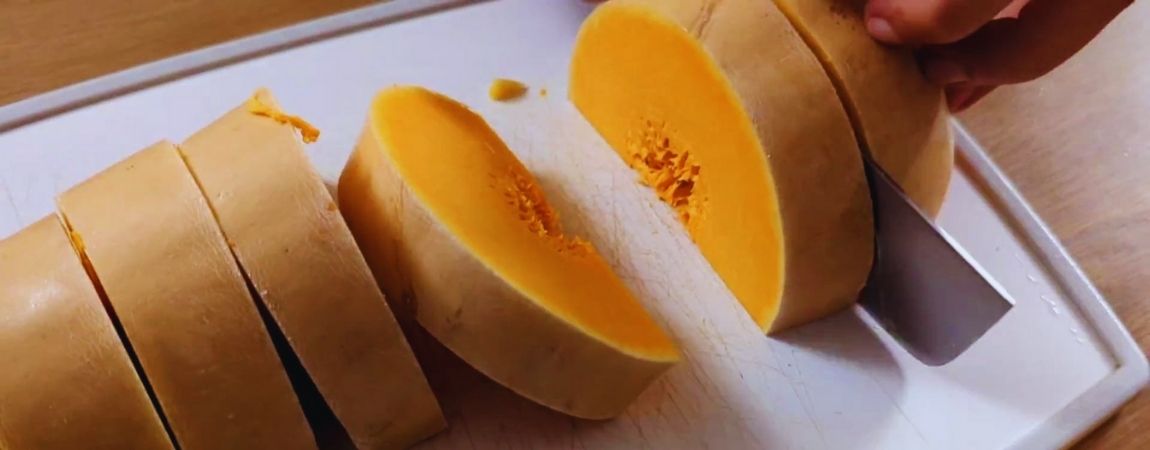
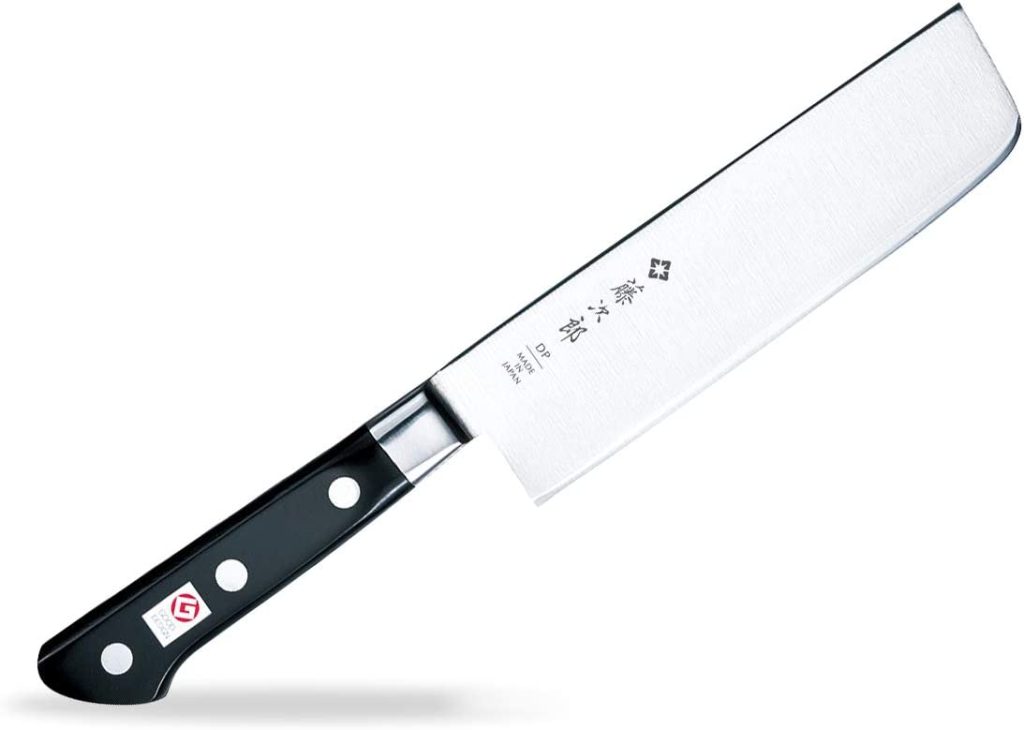
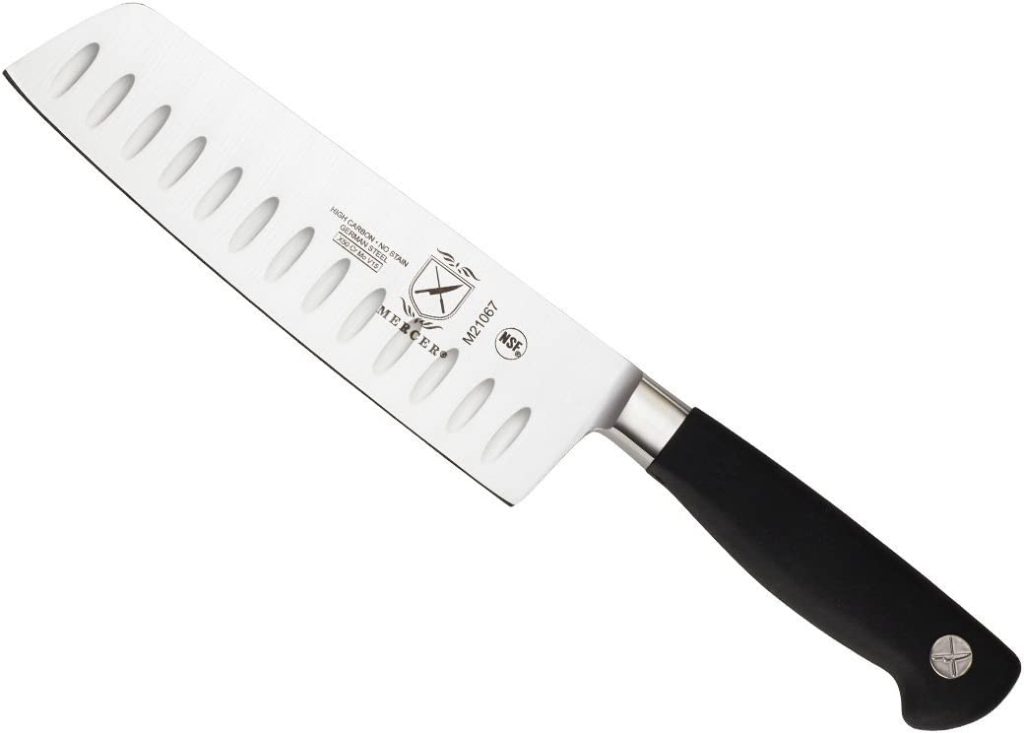
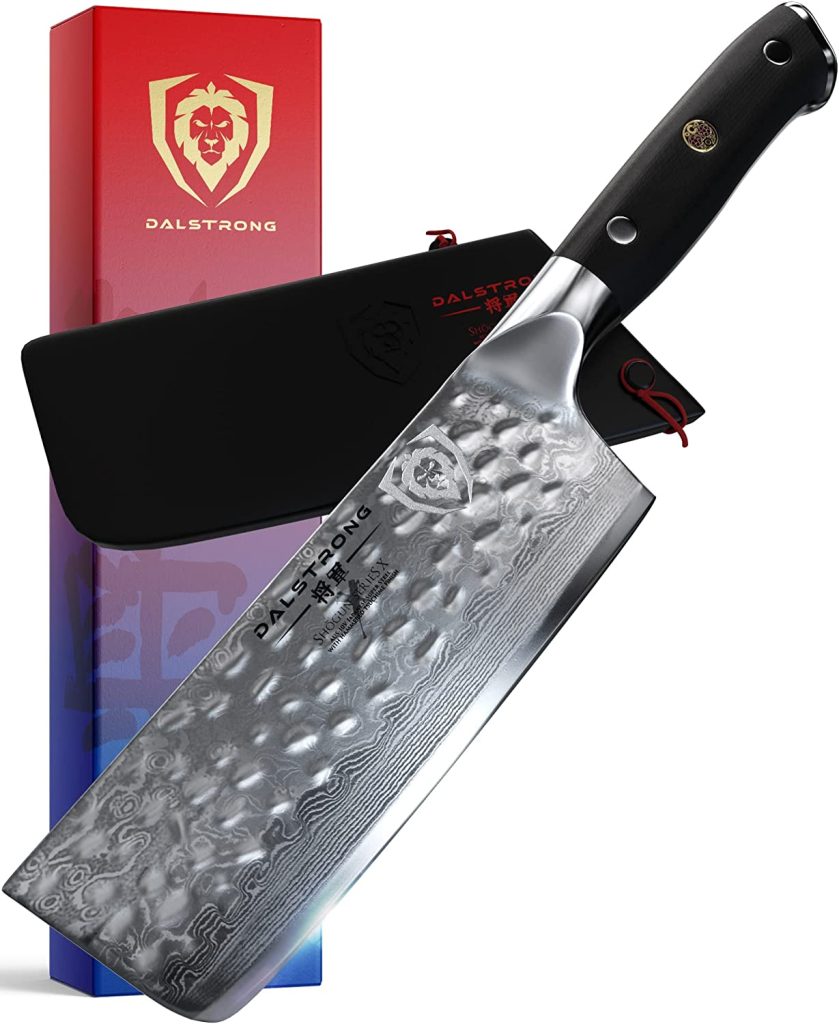
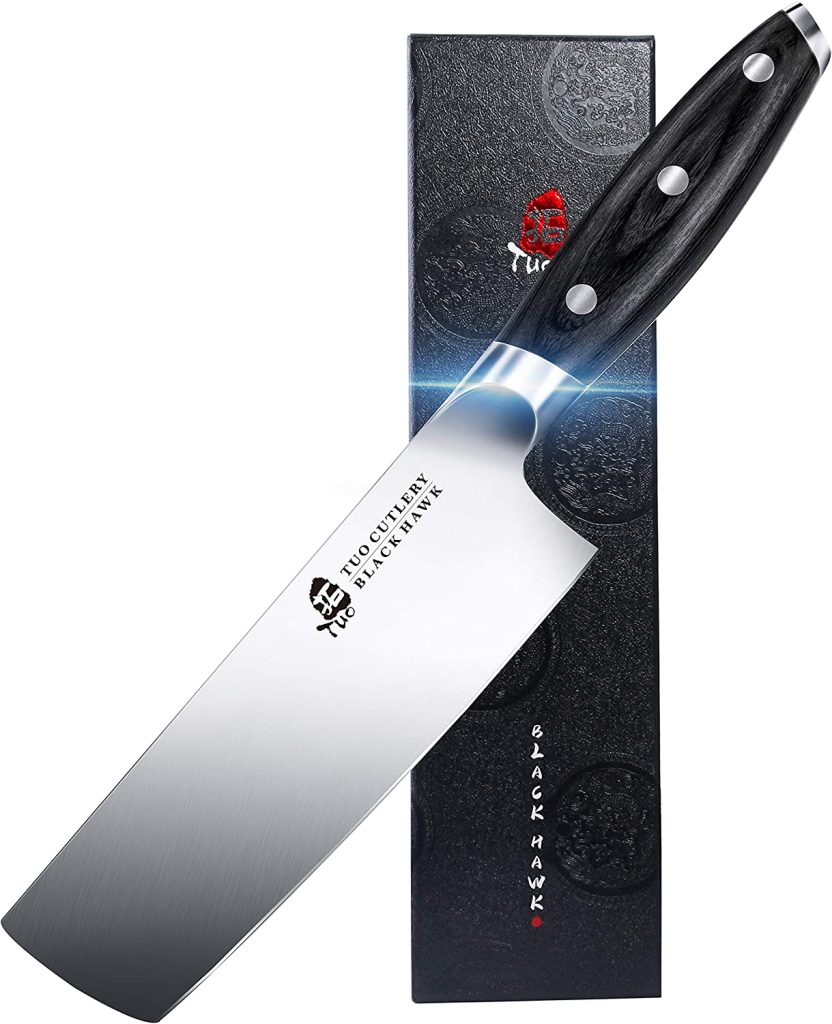


Post Your Thoughts